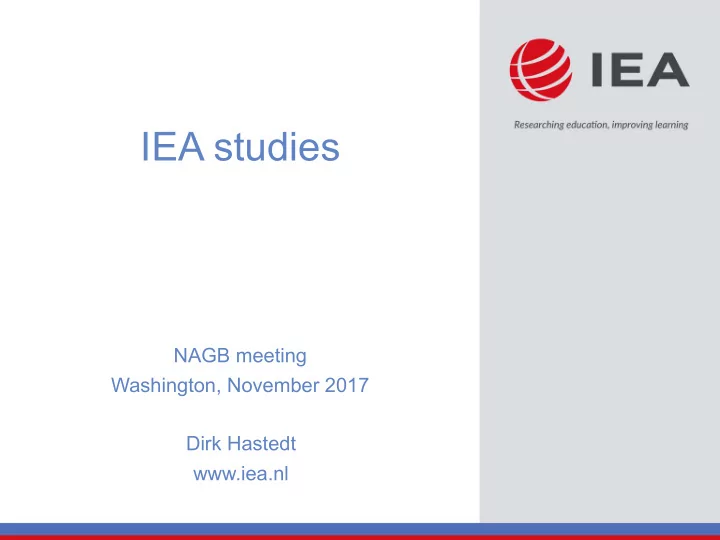

IEA studies NAGB meeting Washington, November 2017 Dirk Hastedt www.iea.nl
2 Overview • IEA • TIMSS • PIRLS • ICILS • ICCS
3 The IEA • Non-governmental research organization • Independent, international cooperative of national research institutions and governmental research agencies • Founded in 1958, more than 30 research studies of cross-national achievement • Large-scale comparative studies of educational achievement and other aspects of education • More than 60 member country institutions, nearly 100 participating countries in IEA studies
4 IEA studies • Enable countries to review the achievement of their students in an international context • Compare their students’ achievement to achievement of students in other countries • Evaluate the relationship of students’ achievement with other factors student background (SES, gender, … ), - their teachers’ background (education, teaching style, … ), - school background (school SES, school infrastructure, - leadership style, … ) Community background (rural/urban, … ) - • International large scale assessments complement national assessments and system monitoring activities
TIMSS Trends in International Mathematics and Science Study
6 TIMSS 2015 and TIMSS Advanced 2015 IEA’s TIMSS assesses trends in mathematics and science achievement every four years in countries around the world. Nearly 60 countries 3 grade levels For 20 years
7 Keeping TIMSS up to date • But changes in the curriculum also pose a challenge to the assessment since TIMSS is based on the curriculum model (intended – implemented –achieved) • Usually: If you want to measure trends, don’t change the measure • BUT if an assessment is not changed but the curricula are, do we really measure the same? • So, for each cycle the countries’ curricula are reviewed and the study framework slightly adapted
8 eTIMSS 2021 • TIMSS is offered in the current cycle also electronically • Will include Problem Solving and Inquiry items which are scenario based
PIRLS Progress in International Reading Literacy Study
10 PIRLS Nearly 50 countries Since 15 years Results com out on December 5th
11 ePIRLS
12 Taking the ePIRLS Assessment Included on Website December 5 Two ePIRLS tasks – Mars, Elizabeth Blackwell • ePIRLS Teacher Avatar • Interactive Passages • PIRLS questions • Scoring guide to see how you did
LaNA Literacy and Numeracy Assessment
14 LaNA: IEA’s Literacy and Numeracy Assessment • Assessment of literacy and numeracy at end of primary school (4 th – 6 th grades) • Provides literacy and numeracy achievement results that can be compared internationally • Designed for countries where TIMSS and PIRLS as well as PIRLS Literacy and TIMSS numeracy are too difficult
15 LaNA Literacy Numeracy • Short vocabulary test • Short test of basic facility with number • Reading comprehension – read passages and answer • Items based on TIMSS questions about them Numeracy • Passages from PIRLS • Only multiple choice items Literacy 2016 assessment • Only multiple choice items
16
ICILS International Computer and Information Literacy Study
18 ICILS • Assesses computer literacy competencies of grade 8 students • First time conducted in 2013 (without US participating) • ICILS 2018 on its way (this time with US participating!) • ICILS also assess students’ computational thinking abilities
19 ICILS 2013: Sample items
20 ICILS 2013: Sample items
21 ICILS 2013: Selected results • Girls scored higher in almost all countries • Boys’ self efficacy was higher in almost all countries • Computers were frequently used by students in schools BUT mostly for simple tasks (using word, power point, search - for information, … ) but not for innovative learning BUT students were rarely taught how to use computers à - student’s achievement differed by SES background more than in other subjects • IN ALL COUNTRIES the major obstacle to use computers and teach how to use them was teachers not feeling comfortable and self confident in the usage and teaching of computer skills (reported by students, principals, technical coordinators and TEACHERS!)
ICCS International Civic and Citizenship Education Study
23 ICCS • ICCS investigates 8 th grade student’s civic knowledge, civic attitudes and the level of their civic engagement • Fourth IEA study on civic and citizenship after 1971, 1999, and 2009 • Next cycle launches in 2018 with the main survey to be conducted in 2022 • ICCS 2022 will also emphasize global citizenship competencies
24 ICCS 2016
25 ICCS 2016
26 ICCS 2016
27 ICCS 2016
28 ICCS 2016
29 ICCS 2016
30 ICCS 2016 – further selected results • Students’ civic knowledge is in all countries associated with - Expected electoral participation - Expected participation in illegal activities (negatively!) • Generally, across participating countries students had positive perceptions of the openness of their classroom climates for discussions of political and social issues. This degree of openness was positively associated with students’ interest in political and social issues, students’ expected level of education and their civic knowledge.
Thank you! Dirk Hastedt d.hastedt@iea.nl
Recommend
More recommend